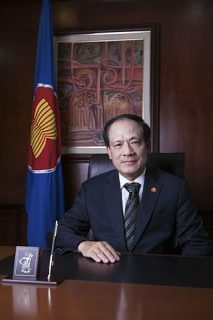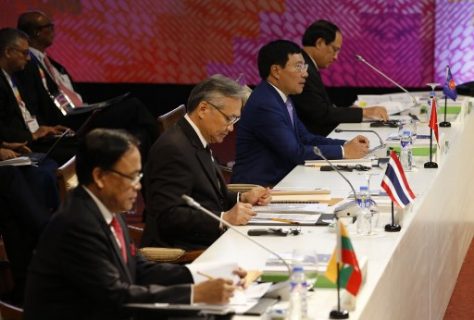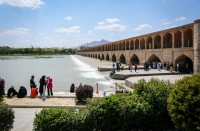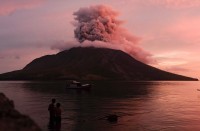
(Eagle News) – ASEAN Secretary General Lê Lương Minh said that the regional bloc’s foreign ministers are pushing for a legally binding Code of Conduct on the South China Sea.
In an interview with CNN Philippines, Minh said that only a legally binding Code of Conduct will be effective in preventing and managing tensions in the South China Sea where various countries have competing claims.
Minh cited that the previous Declaration on the Conduct of Parties in the South China Sea had not helped prevent or solve tensions in the region since it was primarily not legally binding.
The Declaration on the Conduct of Parties in the South China Sea or DOC was signed by the ASEAN foreign ministers and then Chinese Vice-Minister for Foreign Affairs Wang Yi, who is now China’s Foreign Minister.
It was signed on November 4, 2002 in Phom Penh, Cambodia. Then Philippine Secretary of Foreign Affairs Blas Ople signed the document for the Philippines.
-COC should be legally binding for it to be effective, says ASEAN SecGen
“The minister are pushing for an effective COC,” Minh said in the interview.
“For COC to be effective, how can it be — without you know (it being) legally binding?” he said,
Minh noted that the DOC “does not have that character,” referring to the legally binding character that ASEAN foreign ministers now want for the COC to have.
He said the DOC had not been able to prevent nor manage “incidents that have further escalated tensions” the South China Sea.
PHL wants legally binding Code of Conduct
The Philippines’ Department of Foreign Affairs spokesperson Robespierre Bolivar said that the ASEAN’s Joint Communique on the Code of Conduct on the South China Sea was just being reviewed as of Saturday night, August 5.
He said it was being finalized and proofread.
But he admitted that even the Philippines’ Foreign Affairs Secretary Alan Peter Cayetano wanted a legally binding COC.
“Secretary Cayetano has mentioned that the Philippines as a country prefers a legally binding code of conduct. But of course, the caveat there is we have to have an effective code of conduct,” Bolivar said in a press briefing on Saturday, August 5.
“We have to have a Code of Conduct which all the parties observe and adhere to. And I believe that mattered on the discussions on the issue of the South China Sea,” he said.
“But then we have to wait for the joint communique.”
Minh, who was Vietnam’s Deputy Minister for Foreign Affairs before ASEAN leaders endorsed him as the ASEAN Secretary-General for 2013 to 2017, was more categorical in saying that ASEAN foreign ministers want a tougher COC.
-Vietnam urging stronger stand on South China Sea

Vietnam urged other Southeast Asian nations to take a stronger stand against Chinese expansionism in the South China Sea, as a tense regional security forum began on August 5 with North Korea also under fire over its nuclear program. / AFP PHOTO / POOL / ERIK DE CASTRO
Agence France Presse, in its report, said that Vietnam had urged other Southeast Asian nations to take a stronger stand against Chinese expansionism in the South China Sea on Saturday.
It said Vietnam on Friday night sought to insert tough language against China in an ASEAN statement that was scheduled to be released after the Southeast Asian ministers wrapped up their own talks on Saturday.
According to a copy of a draft obtained by AFP, Vietnam lobbied for ASEAN to express serious concern over “construction” in the sea, a reference to China’s ramped up building of artificial islands in the disputed waters in recent years.
Vietnam also wanted ASEAN to insist in the statement that a planned code of conduct for the sea with China be “legally binding”, which Beijing opposes.
Vietnam’s Foreign Minister is Pham Binh Minh who has served as Vietnam’s Minister of Foreign Affairs since 2011, as well as Deputy Prime Minister since 2013.
-Did China violate 2002 DOC provisions?
According to the Declaration on the Conduct of Parties in the South China Sea or DOC of 2002, the governments of the member states of ASEAN and the government of the People’s Republic of China “reaffirm their determination to consolidate and develop the friendship and cooperation existing between their people and governments with the view to promoting a 21st century-oriented partnership of good neighbourliness and mutual trust.”
In the DOC, the ASEAN member states and China, declared the following:
1. The Parties reaffirm their commitment to the purposes and principles of the Charter of the United Nations, the 1982 UN Convention on the Law of the Sea, the Treaty of Amity and Cooperation in Southeast Asia, the Five Principles of Peaceful Coexistence, and other universally recognized principles of international law which shall serve as the basic norms governing state-to-state relations;
2. The Parties are committed to exploring ways for building trust and confidence in accordance with the above-mentioned principles and on the basis of equality and mutual respect;
3. The Parties reaffirm their respect for and commitment to the freedom of navigation in and overflight above the South China Sea as provided for by the universally recognized principles of international law, including the 1982 UN Convention on the Law of the Sea;
4. The Parties concerned undertake to resolve their territorial and jurisdictional disputes by peaceful means, without resorting to the threat or use of force, through friendly consultations and negotiations by sovereign states directly concerned, in accordance with universally recognized principles of international law, including the 1982 UN Convention on the Law of the Sea;
5. The Parties undertake to exercise self-restraint in the conduct of activities that would complicate or escalate disputes and affect peace and stability including, among others, refraining from action of inhabiting on the presently uninhabited islands, reefs, shoals, cays, and other features and to handle their differences in a constructive manner.
Pending the peaceful settlement of territorial and jurisdictional disputes, the Parties concerned undertake to intensify efforts to seek ways, in the spirit of cooperation and understanding, to build trust and confidence between and among them, including:
a. holding dialogues and exchange of views as appropriate between their defense and military officials;
b. ensuring just and humane treatment of all persons who are either in danger or in distress;
c. notifying, on a voluntary basis, other Parties concerned of any impending joint/combined military exercise; and
d. exchanging, on a voluntary basis, relevant information.
6. Pending a comprehensive and durable settlement of the disputes, the Parties concerned may explore or undertake cooperative activities. These may include the following:
a. marine environmental protection;
b. marine scientific research;
c. safety of navigation and communication at sea;
d. search and rescue operation; and
e. combating transnational crime, including but not limited to trafficking in illicit drugs, piracy and armed robbery at sea, and illegal traffic in arms.
The modalities, scope and locations, in respect of bilateral and multilateral cooperation should be agreed upon by the Parties concerned prior to their actual implementation.
7. The Parties concerned stand ready to continue their consultations and dialogues concerning relevant issues, through modalities to be agreed by them, including regular consultations on the observance of this Declaration, for the purpose of promoting good neighbourliness and transparency, establishing harmony, mutual understanding and cooperation, and facilitating peaceful resolution of disputes among them;
8. The Parties undertake to respect the provisions of this Declaration and take actions consistent therewith;
9. The Parties encourage other countries to respect the principles contained in this Declaration;
10. The Parties concerned reaffirm that the adoption of a code of conduct in the South China Sea would further promote peace and stability in the region and agree to work, on the basis of consensus, towards the eventual attainment of this objective.
All the declarations however were not legally binding and had not prevented China from its island building activities, which is contrary to the DOC.
One particular provision of the DOC, under declaration number 5 particularly identified the “exercise self-restraint in the conduct of activities that would complicate or escalate disputes and affect peace and stability including, among others, refraining from action of inhabiting on the presently uninhabited islands, reefs, shoals, cays, and other features
Another DOC provision, declaration number 3 concerned the “freedom of navigation in and overflight above the South China Sea” which China’s recent actions seem to contradict.
Declaration number 3 of the DOC stated that “3. The Parties reaffirm their respect for and commitment to the freedom of navigation in and overflight above the South China Sea as provided for by the universally recognized principles of international law, including the 1982 UN Convention on the Law of the Sea;”
(Eagle News Service with a report from AFP)







